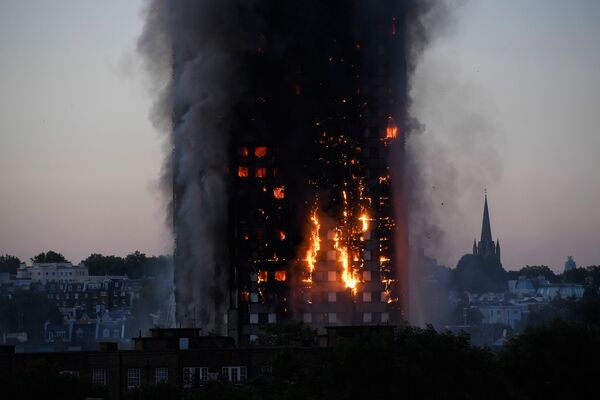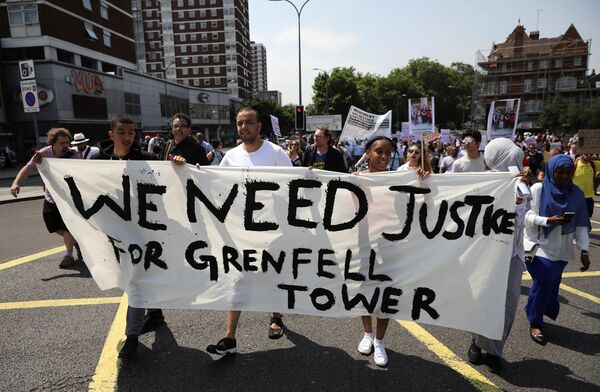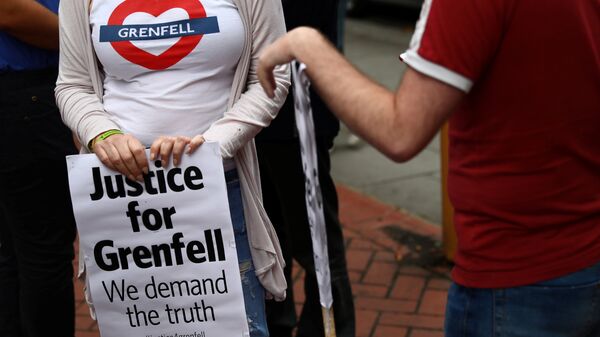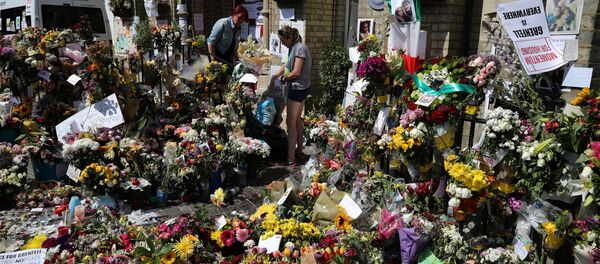However one month on, as bodies are identified and funerals take place, people are slowly coming to terms with their loss and the fact that this fire, which killed at least 80 people, really did happen.
The latest body to be identified was that of two-year-old Jeremiah Deen.
One of the victims who died in the Grenfell Tower fire formally identified as Jeremiah Deen https://t.co/Okkql9qrOc pic.twitter.com/W5WcA95FTq
— Metropolitan Police (@metpoliceuk) 1 August 2017
Many of the survivors and family members of people who perished are suffering from post-traumatic stress syndrome (PTSD) which is defined as an anxiety disorder caused by a very "stressful, frightening or distressing event."
Judy Bolton, a clinical nurse and coordinator of the Justice for Grenfell campaign told Sputnik that the help from local and national government has been minimal and more needs to be done to ensure those suffering from PTSD are helped.
"The UK government or gold command has said they will provide mental health services, to those who are traumatized and obviously in a terrible state. But they are expected to go to them and access these services. So it's not a referral, it's if you feel that you need mental health support, you have to go to them, which beggars belief as many people wouldn't recognize or even know the symptoms of stress, distress, trauma or suicide," Ms. Bolton told Sputnik.
our flyer for tomorrow's meeting for #grenfell communities. All welcome. @NHMC240 1-4pm. Please share for the benefit of all affected. TY pic.twitter.com/5RKM4YAWDi
— Silence Of Suicide (@SOS_Initiatives) 26 July 2017
"This is an unprecedented event and I would have hoped that the Royal Borough of Kensington and Chelsea would have actually seen the need to go to the survivors and bereaved families because they also are traumatized as well," Ms. Bolton added.
Judy Bolton is all too familiar with the symptoms of PTSD, as a trained clinical nurse, Ms. Bolton has seen the impact of the condition, comparing it to the grieving process.
People will be in denial, many will still be living in disbelief that this has happened, but soon the realization kicks in and the person, unable to cope with their loss and the situation, isolates themselves and stops talking in a bid to deal with the pain.
"With PTSD you are not able to rationally process, it's too much, and so people will go into themselves. Also they will go through erratic sleeping, sometimes not even sleeping. Also anxiety — it can paralyze you… You may see someone withdrawn and zapped out in a chair, not moving or blinking and they are locked in their own trauma," Ms. Bolton told Sputnik.
"I spoke to one gentlemen, he has worked all his life… he saved his partner and child from the fire, but now he has to sleep with the light on because he is scared to go to the bathroom at night," Ms Bolton said.
Signs of PTSD are palpitations, difficulty breathing, dizziness, sweating of hands and face. Ms. Bolton said people will also have an irrational fear of going outside and may develop agoraphobia.

Several reports of people trying to commit suicide have recently surfaced. Ms. Bolton is unable to discuss the details in order to protect people's privacy, but she says the trauma of surviving the fire has led many to want to commit suicide or self-medicate with drugs.
"The police are very aware of the drug dealers in the area. They are very aware of certain outlets that provide illicit drugs […]. We have had an influx of people outside of the area coming in to capitalize on the misery. Again those who seek to capitalize only have to ask questions, the drug dealers are more organized than gold command. Again, it's down to Notting Hill police to ensure they go to the outlets and shut these things down," Ms. Bolton told Sputnik
With cuts being made to every area of mental health, accessing support is not easy.

Ms. Bolton commends the local services that have helped thus far, but says waiting times are so long that support has had to be provided by the community.
"We have volunteers who go out at night and help those who can't sleep. Even at 3am you see people walking the streets as they can't sleep. So you have volunteers who will help people and talk to them.
"What we need is a safe place that is accessible 24 hours a day for people to be able to come and help, and receive help [….] People are in a real state and it's a collective state of PTSD," Ms. Bolton concluded.
If you know of someone suffering from PTSD since the Grenfell Tower incident, please contact the Justice for Grenfell website or the Samaritans.



